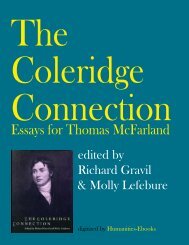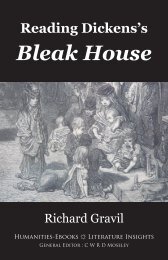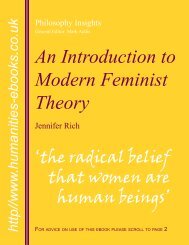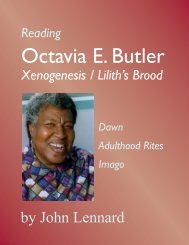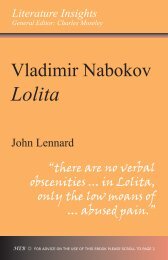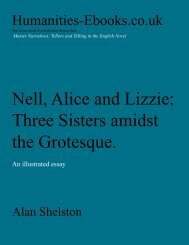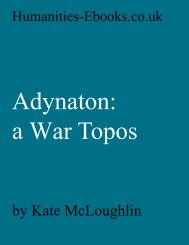Oliver Cromwell - Humanities-Ebooks
Oliver Cromwell - Humanities-Ebooks
Oliver Cromwell - Humanities-Ebooks
Create successful ePaper yourself
Turn your PDF publications into a flip-book with our unique Google optimized e-Paper software.
<strong>Oliver</strong> <strong>Cromwell</strong> <br />
baby <strong>Oliver</strong> was taken up on to the roof of his grandfather’s house by the family’s<br />
pet monkey. In the same category is the claim that, as a young child, he fought with<br />
the young Prince Charles during a royal visit to the home of <strong>Cromwell</strong>’s uncle—an<br />
apocryphal foreshadowing of more serious conflict in later life.<br />
The nature of <strong>Cromwell</strong>’s social status has been a controversial area for historians.<br />
As Lord Protector he famously recalled that he was ‘by birth a gentleman, living<br />
neither in any considerable height, nor yet in obscurity’. The exact socio-economic<br />
meaning of this statement has been extensively debated. <strong>Cromwell</strong>’s father had served<br />
as a Member of Parliament and a Justice of the Peace. His grandfather and uncle were<br />
substantial property owners in Huntingdonshire as a result of the family’s acquisition<br />
of church property following the dissolution of the monasteries. <strong>Cromwell</strong> himself<br />
was elected MP for Huntingdon in 1628–29. It seems, however, that the family’s local<br />
standing was undergoing a process of relative decline during <strong>Cromwell</strong>’s youth. His<br />
inheritance from his father was of limited value. In 1631 <strong>Cromwell</strong> slipped further<br />
down the social hierarchy when, following a dispute over the remodelling of the borough’s<br />
charter, he left Huntingdon for St Ives where he became a tenant farmer. The<br />
position improved five years later when a legacy from his mother’s brother, Sir Thomas<br />
Steward, enabled him to move to Ely, where his income improved as an administrator<br />
of church lands and tithes. Even this left <strong>Cromwell</strong> on the margins of the gentry and it<br />
is worth recalling that his later nickname, ‘Lord of the Fens’, was intended to suggest<br />
that he had merely achieved prominence in a regional backwater.<br />
We should however beware of seeing <strong>Cromwell</strong>’s rise as the spectacular, unaided<br />
ascent of a man wholly excluded from the dominant elite of his time. J. C. Davis has<br />
emphasised the importance in his life of a series of overlapping networks, based on<br />
family ties and shared values, which he strove to cultivate throughout his career. <br />
Martyn Bennett has described <strong>Cromwell</strong>’s gentry background as providing a ‘cocoon’<br />
which fostered his development, and which was by no means unusual in seventeenth<br />
century society. <strong>Cromwell</strong> certainly made an advantageous connection in 1620 when<br />
he married Elizabeth Bourchier, the daughter of a London fur trader and leather<br />
dresser, who owned land in Essex. His marriage drew him into the circle of Robert<br />
Rich, Earl of Warwick, the patron of Felsted School in Essex, at which <strong>Cromwell</strong>’s<br />
Speech to Parliament, 12 September 1654, quoted in Ivan Roots, ed., Speeches of <strong>Oliver</strong> <strong>Cromwell</strong><br />
(London: Everyman, 1989), p. 42.<br />
The fullest examination of this phase is John Morrill, ‘The making of <strong>Oliver</strong> <strong>Cromwell</strong>’ in John Morrill,<br />
ed., <strong>Oliver</strong> <strong>Cromwell</strong> and the English Revolution (London: Longman, 1990), pp. 19–48.<br />
J. C. Davis, <strong>Oliver</strong> <strong>Cromwell</strong> (London: Arnold, 2001), pp. 78–80<br />
Martyn Bennett, <strong>Oliver</strong> <strong>Cromwell</strong> (London: Routledge, 2006), p. 8






